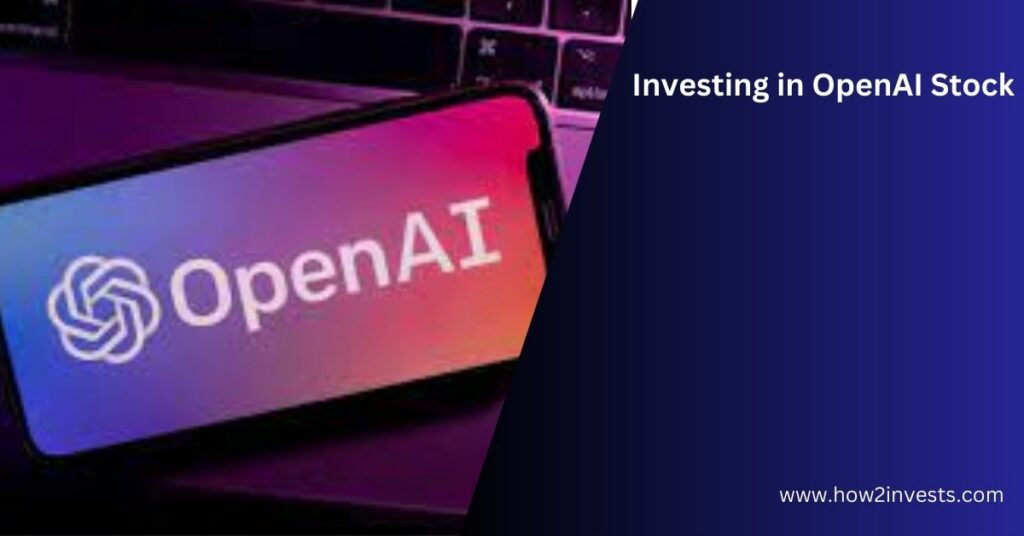How to invest in OpenAI Stock: A Futuristic Opportunity

In the dynamic landscape of technology-driven investments, OpenAI emerges as a beacon of innovation, offering investors a unique chance to be part of the next big thing.
With breakthroughs in artificial intelligence (AI) and language processing, OpenAI has captured the attention of forward-thinking individuals looking to capitalize on cutting-edge advancements.
This article guides you through the process of investing in OpenAI stock, empowering you to make informed decisions in this exciting realm.
Understanding OpenAI’s Potential
OpenAI, a trailblazer in AI research, has continuously pushed the boundaries of what AI can achieve. Their developments span from language models like GPT-3 to autonomous robots, impacting industries from healthcare to finance.
This enviable track record positions OpenAI at the forefront of technological evolution, setting the stage for remarkable growth potential.
Research and Due Diligence
As with any investment, thorough research is paramount. Delve into OpenAI’s financial reports, technological achievements, and strategic partnerships. Analyze market trends and projections, considering both short-term gains and long-term potential.
Identify how OpenAI’s innovations align with global demands and trends, enabling you to gauge the company’s resilience and growth prospects.
Investment Platforms and Brokerage
To invest in OpenAI stock, you’ll need a brokerage account. Choose a reputable and user-friendly platform that provides access to stock trading.
Leading platforms like eTrade, Robinhood, and Charles Schwab offer a seamless interface for investors to buy and manage stocks. Ensure the platform supports trading of the OpenAI stock (usually under the ticker symbol) before proceeding.
Diversification and Risk Management
While OpenAI holds promise, diversification remains a golden rule of investing. Allocate only a portion of your portfolio to OpenAI stock to mitigate risks.
Diversification across various sectors and asset classes cushions your portfolio against market volatility, safeguarding your investments and balancing potential gains and losses.
Stay Abreast of Developments
In the ever-evolving tech landscape, staying informed is crucial. Follow OpenAI’s announcements, product launches, and partnerships.
Monitoring news related to AI advancements and market trends empowers you to make informed decisions. Consider subscribing to tech-focused newsletters or financial news sources to receive timely updates.
Long-Term Vision
Investing in OpenAI stock should align with your long-term financial goals. While short-term fluctuations are inevitable, the potential for substantial growth lies in the company’s sustained innovation and expansion.
Maintain a positive outlook and focus on the bigger picture, resisting the urge to make impulsive decisions based on short-term market movements.
Harnessing OpenAI’s Innovation: A Strategic Approach
OpenAI’s unparalleled contributions to the field of artificial intelligence have made it a frontrunner in the technological revolution. To harness the full potential of your investment, it’s crucial to adopt a strategic approach that aligns with OpenAI’s trajectory. Here’s how to do it:
In-Depth Analysis:
Dive into OpenAI’s whitepapers, research publications, and technological roadmaps. Gain a comprehensive understanding of their advancements, from language models to robotic automation. By comprehending their core technologies, you’ll be better equipped to evaluate their competitive edge and future growth prospects.
Long-Term Vision:
Investing in OpenAI isn’t a short-term endeavor. Embrace a long-term perspective that aligns with the company’s vision of transformative AI applications. OpenAI’s focus on ethical AI, open-source collaboration, and pushing the boundaries can resonate with investors seeking sustained growth and societal impact.
Synergy with Industries:
Identify industries that stand to benefit the most from OpenAI’s innovations. Sectors like healthcare, finance, education, and customer service are ripe for disruption through AI integration. Assess how OpenAI’s solutions can potentially revolutionize these industries and fuel demand for their technologies.
Navigating Volatility: Managing Risks in OpenAI Stock Investment
Investing in pioneering technologies like OpenAI carries inherent volatility. To navigate the fluctuations and manage risks effectively, employ these strategies:
Risk Allocation:
As you allocate funds to OpenAI stock, maintain a well-balanced portfolio. Diversification across different sectors and asset classes helps mitigate the impact of any adverse market movements related to AI-specific events.
Patience Amidst Volatility:
AI stocks can experience rapid price swings due to market sentiment or news cycles. Practice patience during times of heightened volatility. Short-term fluctuations may not necessarily reflect OpenAI’s long-term potential.
Continuous Monitoring:
While a long-term perspective is advised, stay vigilant by continuously monitoring market trends and OpenAI’s progress. Utilize technical and fundamental analysis tools to make informed decisions regarding buying, holding, or selling OpenAI stock.
Ethical Considerations in OpenAI Investment: Impact and Responsibility
Investing in OpenAI goes beyond financial gains; it aligns with ethical considerations surrounding AI’s impact on society. Here’s how you can approach OpenAI investment responsibly:
Ethical Alignment:
Examine OpenAI’s commitment to responsible AI development. Evaluate their efforts to address bias, ensure transparency, and promote AI’s positive societal influence. Investing in a company with strong ethical values can contribute to a more sustainable AI landscape.
Societal Contribution:
Reflect on how OpenAI’s innovations contribute to the betterment of society. Assess their potential to drive efficiencies, solve complex problems, and enhance human lives. Investing in a company that prioritizes positive societal impact can amplify the sense of purpose behind your investment.
Advocacy for Ethical AI:
As an investor, advocate for ethical AI practices within OpenAI and the industry as a whole. Engage in conversations that promote responsible AI development, transparency, and accountability. By investing with an ethical lens, you can actively participate in shaping the trajectory of AI advancements.
Conclusion
Investing in OpenAI stock isn’t just about financial gains; it’s about aligning with a visionary company that’s shaping the future of AI and technology. By strategically approaching your investment, navigating volatility with prudence, and embracing ethical considerations, you can position yourself to be part of a journey that transcends profit, contributing to a more innovative and responsible technological landscape.
FAQ
1: Can Individual Investors Participate in OpenAI’s IPO?
Answer: As of my last knowledge update in September 2021, OpenAI had not yet gone public through an Initial Public Offering (IPO).
However, the possibility of OpenAI going public in the future remains uncertain. If OpenAI does decide to go public, individual investors would likely be able to participate in the IPO through brokerage platforms.
Keep an eye on financial news sources and official announcements from OpenAI to stay informed about any potential IPO plans.
2: Does OpenAI Offer Dividends to Stockholders?
Answer: OpenAI, being a private research organization, has not historically offered dividends, as dividends are typically associated with publicly traded companies that distribute a portion of their profits to shareholders.
In the context of OpenAI’s potential future as a publicly traded company, whether they choose to offer dividends would depend on their financial performance, growth strategy, and corporate policies.
Remember that the structure of dividends, if any, would be determined by OpenAI’s leadership and communicated to shareholders.
3: How Do Regulatory Changes Impact OpenAI’s Stock Potential?
Answer: Regulatory changes in the AI and technology sectors can have significant implications for companies like OpenAI. These changes could encompass areas like data privacy, AI ethics, intellectual property rights, and industry-specific regulations.
Investors should stay attuned to legislative developments and regulatory shifts that might influence OpenAI’s operations, growth prospects, and market sentiment. Regulatory compliance and the company’s ability to adapt to evolving legal frameworks could play a role in shaping its stock potential.
Also Read:
- Unlocking Opportunities Käntäjää: The Translator Investment Advantage
- Unveiling the Käntäj Investment Plan: A Roadmap to Financial Success
- Kääbntäjä : A Guide to Money Investment”
- How Are Bozullhuizas Partners Ltd? Business Model, Services, and Reputation
- Unveiling the Mystery: The Enigmatic World of 2045996879





